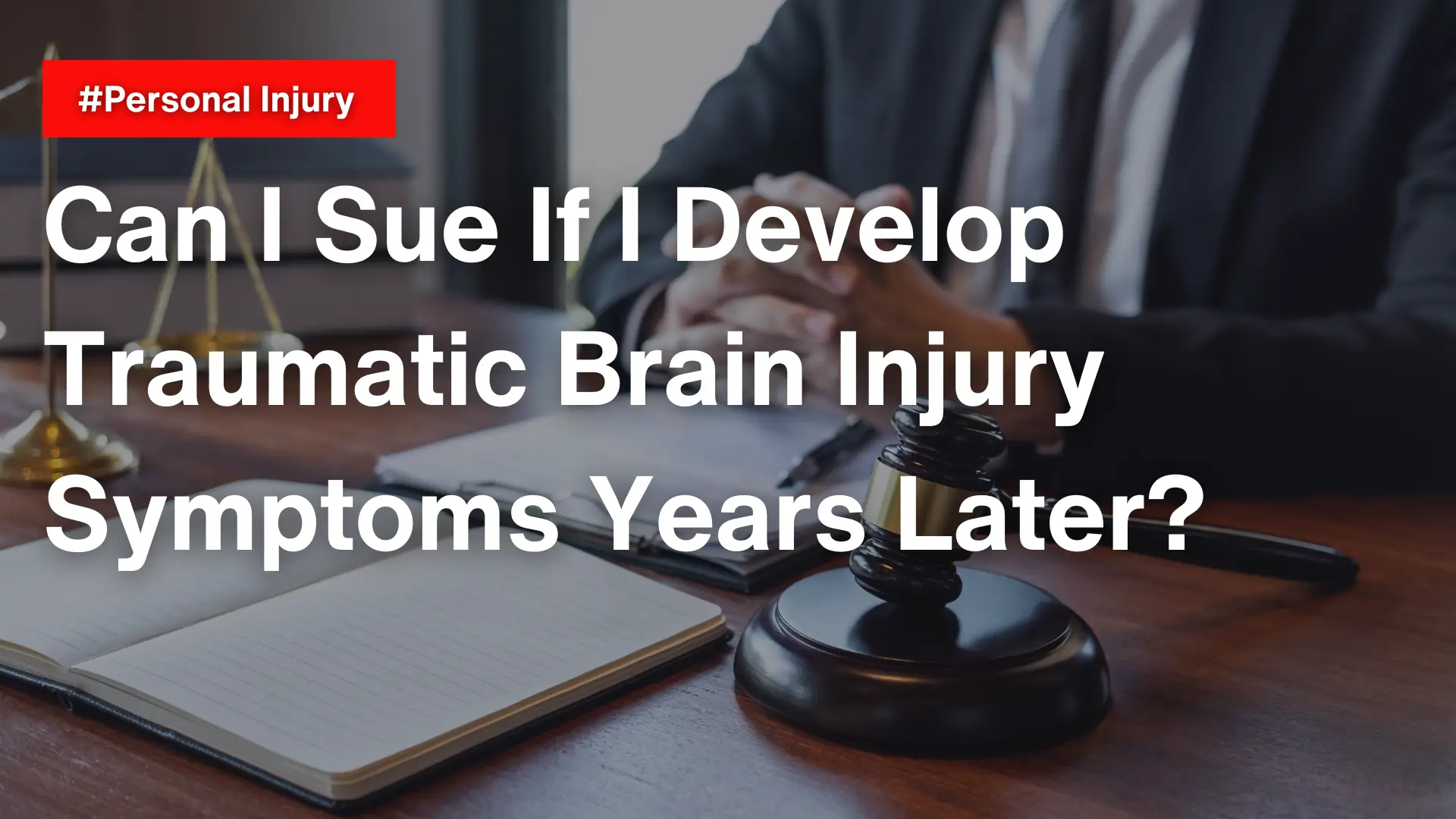 Traumatic brain injuries (TBIs) can have serious, long-lasting effects on the brain. Sometimes, these effects don’t show up right away. Instead, you may experience traumatic brain injury symptoms years later.
Traumatic brain injuries (TBIs) can have serious, long-lasting effects on the brain. Sometimes, these effects don’t show up right away. Instead, you may experience traumatic brain injury symptoms years later.
These delayed symptoms can be frustrating and disruptive, particularly when they start to interfere with your daily life. It raises the question: Can someone sue for compensation if I develop traumatic brain injury symptoms years later? Understanding your rights and some of the challenges of filing a lawsuit for delayed TBI symptoms is essential.
Understanding Traumatic Brain Injuries
A traumatic brain injury (TBI) occurs when a hard hit, bump, or jolt to the head causes injury to the brain. Depending on the impact, TBIs can be mild or severe. For example, a mild TBI, like a concussion, might make someone feel confused or give them a headache for a while. More serious TBIs can cause lasting problems with physical movement, cognition, and emotions, making daily life much harder.
TBIs happen in various ways. Car accidents are one of the most common causes, as the sudden force from a collision can cause the brain to move inside the skull. Other causes include sports injuries, where athletes may suffer hits to the head or falls, especially among older adults.
When a traumatic brain injury happens, symptoms like headaches, dizziness, or memory problems might show up right away. However, these symptoms sometimes don’t appear long, leading to confusion and frustration for those affected.
Why TBI Symptoms May Appear Years Later
It might seem surprising, but TBI symptoms can stay hidden for years before suddenly becoming noticeable. This delayed onset of symptoms can include memory issues, mood swings, difficulty concentrating, or even personality changes. Traumatic brain injury symptoms years later can include several reasons why TBI symptoms might develop after the initial injury.
Although the brain tries to heal itself, for some people, the damage can build up over time. As people age, the brain may struggle to cope with this damage, and symptoms that weren’t a problem before start to surface. Stress, illness, or other injuries might also trigger these delayed symptoms, making them hard to predict.
Dealing with the symptoms of a traumatic brain injury over the long term can disrupt a person’s life in significant ways. For example, they may struggle to remember important details at work or feel constantly irritable and not understand why. These issues can impact their career, relationships, and overall quality of life. That’s why it’s essential to understand that even if someone seemed fine immediately after an injury, their TBI symptoms could still cause problems years later.
Statute of Limitations in Personal Injury Cases
You must file a personal injury lawsuit, including those involving TBIs, within the period dictated by the statute of limitations. This law sets a time limit for how long someone has to file a lawsuit after being injured.
For traumatic brain injury cases in Providence, Rhode Island, the statute of limitations gives you three years to file a lawsuit in most cases. Sometimes, injuries do not show symptoms immediately, and it could take years before someone realizes they’ve been hurt. In cases like this, the “discovery rule” helps. This rule allows the time limit for filing to be extended if a person didn’t know – and couldn’t have known – about their injury until later.
This rule allows people to act legally even if the harm isn’t immediately obvious. For example, suppose someone was injured in a car accident but didn’t start experiencing memory problems until five years later. They might still be able to file a lawsuit. This is because the discovery rule acknowledges that not all injuries are immediately apparent.
Exceptions to the Statute of Limitations
There are a few situations where the statute of limitations might be extended, even without the discovery rule. If the injured person was a minor when the injury happened, the countdown for the statute of limitations usually doesn’t begin until they turn 18. This allows them more time to file a lawsuit after becoming an adult, giving them a fair chance to seek legal action once they’re old enough.
Another example is medical malpractice. If a healthcare provider neglects to diagnose or treat a traumatic brain injury properly, which leads to delayed symptoms, they may extend the statute of limitations. The time limit for filing a claim may vary if the symptoms result from a defective product, like a faulty helmet or vehicle part.
Challenges of Suing for Delayed TBI Symptoms
While the discovery rule can provide extra time to file a lawsuit, proving that TBI symptoms are linked to an old injury can be challenging. The longer the time between the injury and the appearance of symptoms, the harder it can be to prove that the two are connected.
Gathering evidence is an essential part of building a strong case. This includes medical records from when the injury first happened and documentation showing how the symptoms developed over time. Medical experts can provide crucial input in these cases. They can testify that the symptoms are likely related to the original injury and not something else. Without this evidence, you may find it difficult to convince a court that the delayed symptoms are tied to the old injury.
The Importance of Working with a TBI Lawyer
 If you or a loved one is dealing with traumatic brain injury symptoms years after an accident, seeking legal help is essential. An experienced Rhode Island brain injury lawyer can determine whether filing a lawsuit for delayed symptoms is possible. They can also guide you through the process, gather evidence, and get the right medical experts to support your case.
If you or a loved one is dealing with traumatic brain injury symptoms years after an accident, seeking legal help is essential. An experienced Rhode Island brain injury lawyer can determine whether filing a lawsuit for delayed symptoms is possible. They can also guide you through the process, gather evidence, and get the right medical experts to support your case.
Contact Our Traumatic Brain Injury Lawyer Today
Filing a lawsuit can be overwhelming, especially when dealing with complex medical issues. A Rhode Island brain injury lawyer can take the weight off your shoulders and give you the best chance of receiving compensation for your losses and expenses.
If you’re experiencing symptoms from a traumatic brain injury, don’t wait to explore your legal options. Contact Law Offices of Ronald J. Resmini, Accident & Injury Lawyers, Ltd. at (401) 751-8855 today to schedule a consultation and learn more about how we can manage your case.
Related Posts:
RI Personal Injury Attorney: Common Car Accident Injuries
